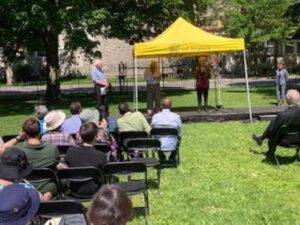Ordinary People; Extraordinary Actions: People of Faith Do Make a Difference
Whenever we consider the major problems facing the world today – global pandemics, famine in Africa, war in Ukraine, the climate emergency and ecological destruction – we can easily be overwhelmed. Our feelings of helplessness militate against making change happen.
But a newly published book by four researchers at the University of Ottawa tells a different story – how a dogged commitment to Gospel values led several generations of faithful people to create beneficial change in the lives of others.
 On World Refugee Day, June 20, 2022, on the grass facing the University of Ottawa’s Tabaret Hall (named after a founding Oblate priest) and in the shadows of St. Joseph’s Church next-door, over 100 people celebrated the launch of “Ordinary People, Extraordinary Actions: Refuge Through Activism at Ottawa’s St. Joseph Parish.”
On World Refugee Day, June 20, 2022, on the grass facing the University of Ottawa’s Tabaret Hall (named after a founding Oblate priest) and in the shadows of St. Joseph’s Church next-door, over 100 people celebrated the launch of “Ordinary People, Extraordinary Actions: Refuge Through Activism at Ottawa’s St. Joseph Parish.”
What led researchers to focus on this particular instance of helpful community activism? They were amazed by the commitment to inclusivity, long-term service, and meaningful advocacy for policy change that made a difference in both people’s lives and in the structure of Canadian society. Indeed, over the last three decades, “more than 125 committee members hosted and sponsored over 200 refuge-seekers.” (page 10)
Speakers included the university’s President, refugees and refugee advocates, as well as the authors themselves. Moving tributes were also presented by current and past members of St. Joe’s “Refugee Outreach Committee (ROC.)” Louise Lalonde (whose brother is an Oblate priest) started the work of the ROC in 1990 and has remained an active guiding light ever since. Pierre Gauthier, who chaired the ROC in 2005, led the advocacy effort to convince the negligent federal government of the day to grant refugee status to a woman granted sanctuary for over a year by the Oblate parishes of Sacré-Cœur and St. Joe’s. (The parishes once organized a prayer vigil with almost 400 in attendance, followed by a cold march to Parliament Hill where MPs from all political parties spoke in favour of granting permanent residency status to this woman. She was able to emerge from sanctuary after a year and resides in Ottawa as a Canadian citizen today.)
John Weir spoke on behalf of currently active ROC members like Sr. Connie Goulet, Deborah Dorner and current ROC chair John Sommers. He noted that (page 113), the authors attributed the ROC’s three decades of longevity, in part, to St. Joe’s institutional structure and support, the parish’s commitment to social justice and lay leadership. Weir quipped, “St. Joseph’s parish has been the earth on which our ROCK has formed.”
When you hear of such stories, you might be inclined to think that this is all well and good, but making change happen is really nothing that you could do in your own life. After all, when as children we studied history, we got top marks for knowing the dates of great battles, wars and discoveries (each accomplished most often, we were told, by great men.) These legendary figures, we were told, determined the course of the present we have inherited.
Even today, in the “official” recounting of the history of refugee policy in Canada, such narratives persist.
Just last year, a former high-ranking government bureaucrat informed me of their view that the Catholic Church was well behind other smaller congregations in terms of sponsorships of the “boat people” from Southeast Asia in the early 1980s. To resolve this supposed hierarchical lassitude, the then Assistant Deputy Minister of Immigration invited several bishops to lunch at the Chateau Laurier, and “gave them a verbal scolding” for their lack of response to such a critical humanitarian need. Apparently, “it was after that that the Canadian Bishops publicly gave support to the (government’s) program and sent messages to the parishes encouraging them to participate.”
If such theories of great men changing history over lunches at exclusive clubs would only ring true, then just think how easy it would be to change anything in the Catholic Church!
Rather, this study contends that individuals from communities of faith like Ottawa’s Mayor Marion Dewar, a devoted Catholic (who launched Project 4000 to bring Southeast Asian refugees to this city), set the stage for community sponsorship that eventually settled more “boat people” per capita than any other Canadian city (page 6.) When recounting how the ROC at St. Joe’s provided sanctuary, settlement, spoke at parliamentary committee hearings on refugee policy, and raised funds for refugee sponsorship, the authors conclude:
“…the everyday choices of a small number of dedicated, ordinary people…can bring about extraordinary waves of change in the lives of others and in Canada’s policies and politics.” (page 109.)
“Ordinary People, Extraordinary Actions: Refuge Through Activism at Ottawa’s St. Joe’s Parish”, was written by Stefanie Morris, Karina Juma, Meredith Terretta and Patti Tamara Lenard and can be ordered from the University of Ottawa Press.
By Joe Gunn – Director of Le Centre Oblat and a member of St. Joseph’s Parish in Ottawa. (He has never been invited to lunch at the Chateau Laurier.)


